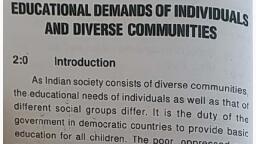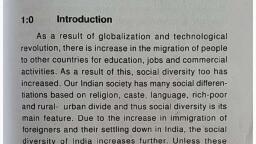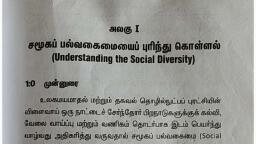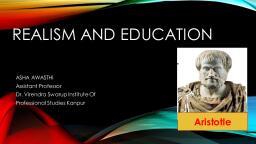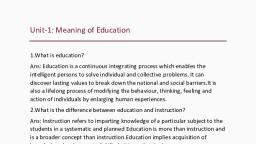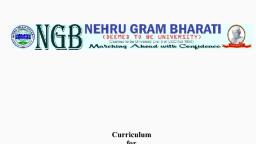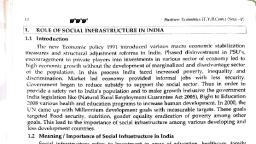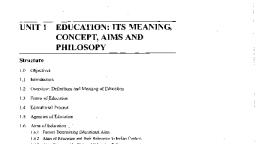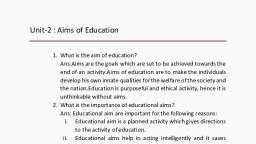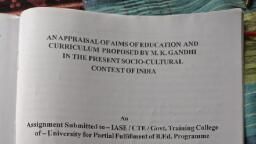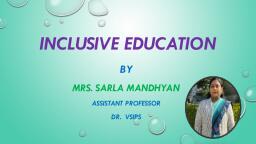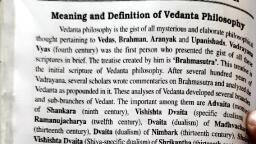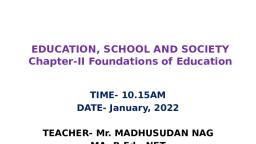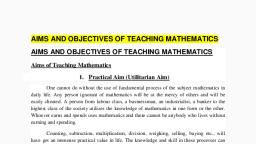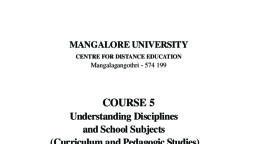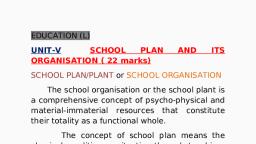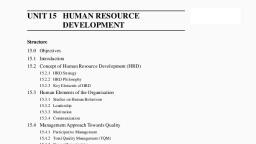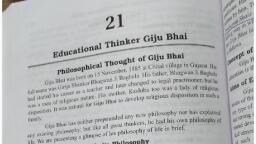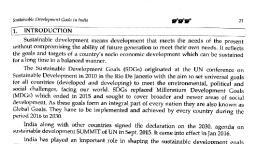Page 1 :
different sources of derivation. According to one view, means 'to bring up' or ' to nourish'. This implies that the, 'Education' originated from the Latin word 'educare' which, child is to be brought up according to certain aims and ends, Etymologically, the term 'Education' is traced to, 1:01 Concept of Education, 'Education' originated from the Latin word 'educare' which, This implies that the, means 'to bring up' or ' to nourish'., child is to be brought up according to certain aims and end, in view. There is another derivation from the Latin wor, 'educere' which means to lead out or 'to draw out' -e, means 'out' and 'ducere' means 'to lead. According to this, view the main aim of education is 'to draw out' rather than, 'put in'. The third view point tells us that the term 'education, is derived from the Latin word 'educatum' which means 'the, act of teaching or training'. Thus we can see that according to, Latin words 'educare' and 'educatum', education is something, external which is imposed from outside. But according to the, Latin word 'educere', education means growth from within. It is, in this latter sense that most of the modern educationists use, and imply the term 'education' these days., Scanned by CamScanner
Page 2 :
1:03 Definitions of Education, Education being a most important social activity, its, meanings have been changing through the ages due to, changes in social and physical conditions as well as, philosophical outlook of people towards life. Different, educationists, therefore, interpreted it differently, at different, times. Some of the most popular definitions, given by our, ancient educational thinkers are given below:, 1) Vivekananda: "Education is the manifestation of, divine perfection, already existing in man". According to him, "The aim of all education, all training, should be man-, making.... We want that education by which character is, formed, strength of mind is increased, the intellect is, Scanned by CamScanner
Page 3 :
2) Tagore: "Education means enabling the mind to find, Education in tho Emarging Indian Society, bondage of the lust and gives us the wealth, not of things, out that ultimat truth which emancipates us form the, individuality of the child so that he can make an, Adams: "Education is a conscious and deliberate, process in which one personality acts upon another in order, to modify the development of the other by communication, T.P.Nunn: "Education is the complete development of, expounded and by which one can stand on one's own feo, What we require is - "life-building, man-making and, character-making education"., 2) Tagore: "Education means enabling the mind to fina, bondage of the lust and gives us the wealth, not of things, but of inner light, not power butof love, making this truth of, its own and living expression to it"., 3) Aurobindo Ghosh: "Education is helping the, growing soul to draw out that is in itself:,, 4) Mahatma Gandhi: "Education is the all-round, drawing out of the best in child and man – body, mind and, sprit"., Thus Indian view of education is essentially spiritual, and intellectual in character., Definitions encompassing the Western concept of, education are given below:, Aristotle: "Education is the creation of sound mind in, a sound body. It develops man's faculty, especially his mind, so that he may be able to enjoy the contemplation of, supreme truth, goodness and beauty of which perfect, happiness essentially consists"., Pestalozzi: "Education is natural, harmonious ane, progressive development of man's innate powers"., and manipulation of knowledge"., T.P.Nunn: "Education is the complete development, individuality of the child so that he can make an, original, Scanned by CamScanner
Page 4 :
Education : Its Meaning and Various Lovels, 5., contribution to human life according to the best of his, capacity"., Ross: "The main aim of education is the development, of valuable personality and spiritual individuality., Thus it could be seen that most of Western, educationists view education as development and growth, of endowed innate potentials., The most comprehensive and acceptable definition of, the term 'education' has been advanced by Redden. He, says,, "Education is the deliberate and systematic influence,, exerted by the mature person upon the immature, through, instruction, discipline and harmonious development of, physical, intellectual, aesthetic, social and spiritual powers, of human being, according to individual and social needs, and directed towards the union of the educand with his, creator as the final end"., 1:04 Characteristics of an Educated Person, a) The educated person will have special attainment in, selected fields which will be of much use in life., b) He will be able to convey his ideas to others in a lucid, manner., c) He will have open mind to receive new ideas. That is he, will avoid narrow outlook and will have positive attitude, towards new information and practices., d) He will develop the skills of working in cooperation with, others and show great concern for development and, welfare of the society., e) He will be able to appreciate beautiful things in the, world. He will be able to discipline himself and cultivate, good qualities., Scanned by CamScanner
Page 5 :
thereby develop himself to understand the world better, knowledge, attitudes and skills of the people. The behaviour of, In short, education brings about great changes in the, He will improve his spiritual power and intelligence and, 6., 1. Knowledge 2. Vocational 3. Moral 4. The Complete 5. Harmonius 6. Leisure, Education in the Emerging Indian Society, f) He will improve his spiritual power and intelligence a, In short, education brings about great changes in, knowledge, attitudes and skills of the people. The behaviour, educated people vastly differs from those of the uneducated, 1:05 Aims of Education, Aims of education serve as the basis for all the, elements involved in the educative process. Educational, aims indicate the goals to which all our educational, programmes are to be geared to. The aims that are to be, achieved in a short period of time are termed as 'objectives', There are mainly two types of aims :, 1. General Aims, 2. Specific Aims., General aims of education are those which apply in their, generality to the whole of mankind. Specific aims of, education are relative to the conditions available at a, particular time. They change with the changing needs., General aims may be classified as 'Individual' and, "Social' aims of education. Specific aims of education are, (i) The knowledge aim (ii) Vocational aim (iii) Moral aim, (iv) Complete living aim (v) Harmonious development of, personality aim (vi) Aim for spending the leisure time usefully etc., Aims of Education, General Aims, Specific Aims, Individual Aims, Social Aims, Aim, Aim, Aim, Living Aim, Development, of Personality, Aim, Scanned by CamScanner
